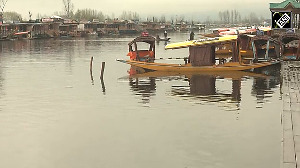With 301 medal events involving 202 nations, the Athens Olympics will represent the high-water mark of the most important event on the sporting calendar.
Faster, higher, stronger -- the underlying athletic concept of the Olympics -- has been accompanied over the past 25 years by a trend towards bigger and bigger Games.
| |||||||||||
Four years ago Sydney played host to 10,615 athletes from 199 nations in 28 sports, and 200,000 people including officials, volunteers and media representatives were accredited.
Jacques Rogge, president of the International Olympic Committee (IOC), believes this so-called gigantism has gone far enough and has vowed to help organising cities to cut costs.
"The Games have reached a critical size which may put their future success at risk if the size continues to increase," an IOC study commission on the issue reported in 2002.
Rogge, chief coordinator for the Sydney Games before becoming president, hopes cost reduction would allow cities in Latin America and Africa to host the Games.
Every additional athlete is estimated to cost Games organisers $30,000, every additional journalist $15,000.
"Steps must be undertaken and serious consideration given to effectively manage future growth, while at the same time preserving the attractiveness of the Games," the IOC said in 2002.
REVIEWS LAUNCHED
In 2000 it was decided not to introduce any new sports in Athens, although women wrestlers will take to the mat for the first time.
In May, the IOC decided not to exclude any sports until 2012 but Rogge has put the 28 Olympic sports on notice that they risk being removed if they cannot prove their worth. A review of the Olympic programme will be conducted soon after the Athens Games.
Softball, modern pentathlon and baseball narrowly avoided being expelled from the Olympic family two years ago and all three are aware they must look their best in Athens this month if they are to survive long-term.
Even officials in core Olympic sports such as fencing, shooting and weightlifting are concerned they could be pushed out of the Olympic family. The last sport to be removed was polo in 1936.
Last December's council meeting of archery's governing body FITA was dominated by worries about the sport's Olympic status. Members were told that "sometime next year we will have to present why we should be at the Games".
"What can we do to be popular in 10 months?" the meeting's minutes read. However, archery has been dealt a trump card by the Athens organisers.
The competition will be held in the fourth-century-BC, white-marble Panathinaiko Stadium, setting of the first modern Olympics in 1896, which will provide a superb backdrop.
Television appeal is all-important in the 21st century and a "modern" sport such as beach volleyball, with its eye-catching displays of bronzed flesh, wins hands down against more esoteric sports such as archery and shooting.
Shooting is one of several sports to have had its athlete quota reduced for the Athens Games and it will lose two events in 2008. The IOC had originally wanted to cut five events from a shooting programme that encompasses 17 gold medals in Athens.
THIN END
Shooting officials are clearly worried this reduction is the thin end of a dangerous wedge but their sport is a prime example of the expansion of the Games. Shooting had nine events in 1980 and its programme grew at every Olympics until 2000.
Fencing, one of only four sports to appear at every modern Olympics, has tried to make itself more viewer-friendly by introducing transparent masks.
However, officials are aware that fencing's opaque scoring system, and the standard of refereeing, are long-term problems that need sorting out before it can sure of its Olympic place.
Rogge has promised to take into consideration a sport's history and Olympic tradition, as well as its public and media appeal, how many people play the sport in how many countries, its anti-doping activities -- something that gives weightlifting cause for concern -- and its judging.
An IOC commission recommended in 2002 that baseball be excluded from the 2008 Games because of its patchy popularity worldwide, the high cost of venue construction and the problems of attracting the best professionals from North America.
Modern pentathlon and softball were also deemed not popular enough and too expensive, but they were all reprieved after passionate defences by the sports' officials at an IOC meeting in late 2002.
The IOC has warned three-day eventing it could be excluded from Beijing and has proposed to cut back on synchronised swimming, shooting, rowing, badminton and sailing events.
Rogge is aware that many international federations rely heavily on IOC funding derived from Games profits. Exclusion could deal a financial death blow to sports such as modern pentathlon.
However, the IOC wants to keep the Olympics relevant to the modern world and feels it is anomalous not to include hugely popular sports such as rugby and golf.
"People forget about the millions of athletes whose sports are outside of the Olympic programme," Rogge said in 2002.
"The question is: 'Don't we have sports outside that deserve better to be in the programme?'"








 © 2025
© 2025